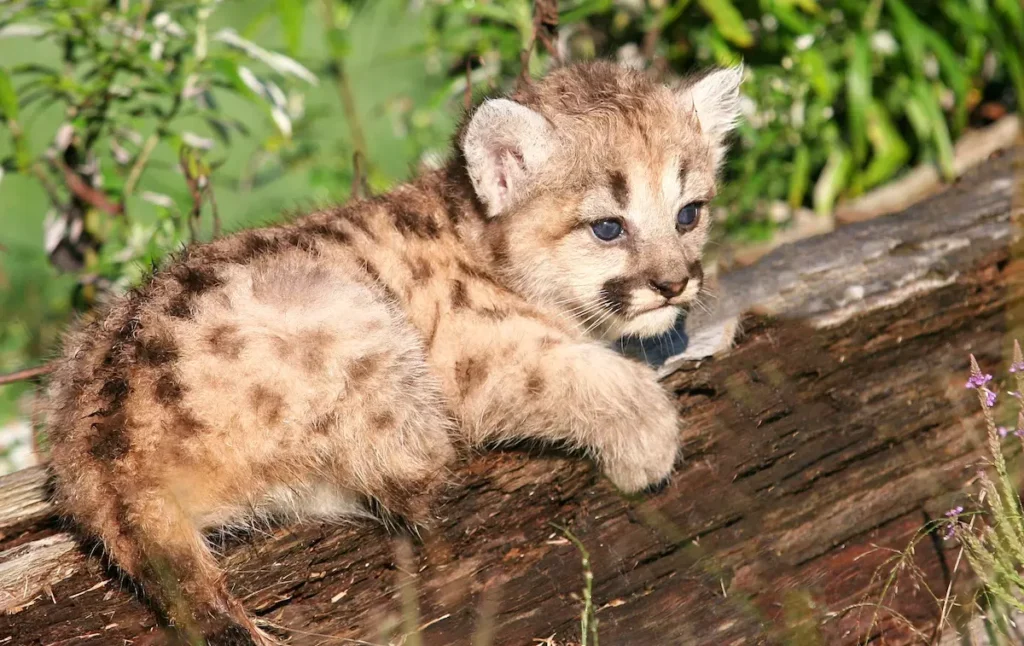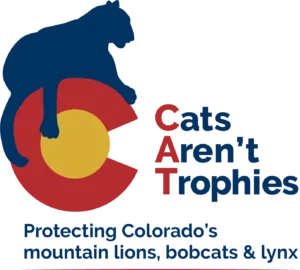Colorado fair-chase, ethical hunters, anglers, veterinarians, sanctuary advocates, wildlife scientists, photographers, and others join together to advance 2024 ballot measure aiming to give voters the opportunity to halt needless and cruel killing of inedible, unoffending lions and bobcats that play a vital ecological role in native habitats
Colorado – Cats Aren’t Trophies (CATs), a new political committee in Colorado, has filed 2024 ballot language to ban trophy hunting of mountain lions and trapping of bobcats. The measure also protects lynx, who are sometimes mistaken for bobcats and killed.
Read the ballot language HERE.
In Colorado, a mountain lion trophy hunter uses a pack of dogs – up to eight – fitted with GPS collars to keep track of the pack as it chases a fleeing cat up into a tree. The “hunter” then finds the location with high tech telemetry equipment, walks up, and shoots the cat off of a tree limb. Trophy hunting guides offer these “guaranteed” kills for a bucket list trophy tom, collecting fees of up to $8,000 for a highly commercialized exercise for their clients.

Bobcats are hounded, too, but because of their beautiful fur, they are also trapped, with their pelts exported to Russia and China.
The annual statewide death toll is alarming, with trophy hunters and fur trappers taking on average 500 mountain lions and 2,000 bobcats from Colorado’s wild places.
“I’ve lived all my life in Colorado and have spent decades rescuing wildlife that suffers at the hands of humans, including mountain lions,” said Pat Craig, native Coloradan and founder of The Wild Animal Sanctuary in Keenesburg, the state’s premier wildlife sanctuary and a top destination for Coloradans and people throughout the nation. “I am on the ground floor of the CATs initiative because it is unsporting and inhumane to kill mountain lions for trophies and bobcats for their fur in Colorado.”
“More than 30 years ago Coloradans voted to ban hunting black bears with dogs by a 70 percent majority. If sending packs of dogs to chase bears through our forests is bad for bears, including mothers with dependent young, it’s bad for mountain lions and bobcats, too,” said the Colorado-based Julie Marshall, national communications coordinator for Animal Wellness Action and the Center for Humane Economy. “Shooting a cat that is stuck in a tree with nowhere to go is no different than shooting a lion in a cage at the zoo.”
Colorado mountain lions and bobcats are killed primarily so their body parts can be used as trophies, or their fur sold to foreign markets. Trophy hunters do not kill mountain lions and bobcats for their meat and research demonstrates that killing mountain lions and bobcats for trophies and fur serves no legitimate management purpose. Eating domesticated cats – made of the same sinew as wild cats – is so indefensible that a federal law bans commerce in it.
“When I became a veterinarian, I took an oath to end animal suffering. And when I learned that a bobcat in my community had been trapped and strangled to death, I vowed that this would be the catalyst for change for the humane treatment of bobcats,” said Christine Capaldo, D.V.M, a veterinarian in Southwestern Colorado.
CATs recognizes that the ranching community occasionally has conflicts with mountain lions and bobcats, and the ballot measure preserves current state law allowing for mountain lions posing a risk to “human life, livestock, real or personal property” to be killed for public safety.
The CATs coalition also recognizes the important role of deer and elk hunting in Colorado in supplementing food budgets, along with the value of hundreds of thousands of deer and elk hunting licenses sold in the state each year (less than 1 percent of all hunters or Coloradans ever pay for a mountain lion license). But Colorado’s hunting heritage is in jeopardy due to the spread of Chronic Wasting Disease, an always-fatal neurological disease that infects cervids. Mountain lions, according to peer-reviewed research, play a role in removing infected cervids, sometimes before any symptoms are evident. A fascinating map shows an inverse spatial relationship between the presence of lions and the highest rates of chronic wasting disease among deer and elk.
“I have been hunting my entire adult life and quickly realized the difference between trophy, “thrill killing” and the type of hunting that doesn’t fall into those categories, such as sustenance hunting. Mountain Lion hunting almost always falls into the trophy and/or “thrill kill” category,” said Dave Ruane of Weld County, a deer and elk hunter and avid outdoorsman.
“Wild cat hunting and trapping violates the North American Model, and that is one big reason why it’s time to relegate this to the history books and get rid of antiquated practices that tarnish ethical hunters,” said Charles Seymour, also a lifelong Colorado outdoorsman. “GPS hounding of lions merely reduces the practice to shooting, not hunting.”
Research demonstrates that mountain lion populations self-regulate or limit their numbers by maintaining and defending vast territories; their populations are dependent upon space and available prey populations, meaning less deer or elk equals less lions. Wildlife scientists also note that it is nearly impossible to distinguish the gender of a mountain lion in the field. Inevitably, trophy hunting mountain lions results in orphaned cubs and juveniles, who can stay with their mothers for the first year and even longer to learn essential survival skills. Statistically, orphaned kittens will die with just a 4% chance of survival, and mainly from starvation.
“Whenever you have trophy hunting mountain lions, you will have created orphans,” said Rick Hopkins, a nationally recognized wildlife ecologist and member of CATs, who has dedicated more than 45 years to the study of large mammalian carnivores.
“As a scientist who has lived and worked on Colorado’s West slope for three decades, over which time I’ve witnessed the dramatic decline of native biodiversity, I believe we have an ecological imperative to prevent the trophy killing of mountain lions and indiscriminate trapping of bobcats, which has collateral damage to other native species including the threatened Canada lynx. As a human, surrounded by the beauty and promise of our public lands, I believe we have an ethical obligation to ensure that native wildlife finds the refuge they need to thrive on our public lands – not a barrage of traps, hounds and guns,” said Delia Malone, ecologist with the Colorado Natural Heritage Program and vice-chair of Roaring Fork Audubon, Redstone.
“Americans love big cats, and that’s why Congress just passed the Big Cat Public Safety Act to halt the breeding and trade in big cats as pets,” said Carole Baskin, CEO of Big Cat Rescue. “Similarly, Americans don’t like trophy hunting of lions with packs of dogs, orphaning of the young after the shooter slays a mother, or trapping bobcats for fur coats worn in China.”
“Our vision includes a community in which wild animals thrive alongside people and have a facility to recover if they need it,” said Amanda Lau, Executive Director of Greenwood Wildlife Rehabilitation Center in Longmont. “We believe that Colorado’s cats should be protected from ‘guarantee kill’ sport hunting.”
“We invite all Colorado residents to join us in a campaign to end a highly commercial, high-tech head-hunting exercise that doesn’t produce edible meat or sound wildlife management outcomes, but only orphaned cubs and social chaos among the surviving big cats,” concluded Samantha Bruegger, campaign manager for Cats Aren’t Trophies.
Visit www.catsarenttrophies.org as a comprehensive resource on the campaign to protect Colorado’s native wild cats and to preserve their role in delivering ecological services to Colorado. Endorsers include The Wild Animal Sanctuary, Greenwood Wildlife Rehabilitation Center, Humane Society of Boulder Valley, Northern Colorado Wildlife Center, Big Cat Rescue, The Mountain Lion Foundation, The Cougar Fund, Biophilia Foundation, Bell Meadow Farm, PC’s Pantry for Dogs & Cats Inc., The Wild Source (eco tourism), The Animal Hospital of Telluride, and dozens more listed on our website.

